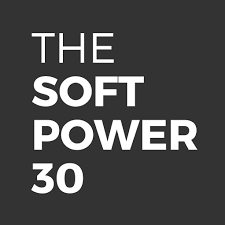
http://www.dw.com/en/the-macron-effect-france-now-worlds-top-soft-power-...
"Using data and polls in 25 countries, PR firm Portland Communications working with the University of Southern California school of public diplomacy looked at data from six categories: government, culture, global engagement, education, digital and enterprise. It also included a country's attractiveness for both tourists and foreign students.
In its introduction, the report explains power in the past was determined largely by armies and economic might. Today, it argues, power has become more diffuse and has also moved away from governments as "more non-state actors leverage international influence," due largely to the digital revolution"
Find here the report:http://softpower30.portland-communications.com/wp-content/uploads/2017/0...
Find here the ranking: http://softpower30.portland-communications.com/
http://softpower30.portland-communications.com/what-is-soft-power/
The current global rebalancing must be read as an urgent call to action for leaders, diplomats, and foreign policy makers. Without question, those charged with shaping their nation’s foreign policy need to be ready for the uncertain times ahead. As countries work to make sense of the rapidly changing context and adjust strategies accordingly, the soft power resources at the disposal of governments will be a critical part of the foreign policy tools needed going forward. Those countries most adept in using soft power to facilitate positive collaboration will be better placed to weather the current uncertainty and geopolitical instability, and ultimately shape global events. This leads to the question: how can soft power be deployed effectively?
Power in international relations has traditionally been defined and assessed in easily quantifiable ‘hard’ terms, often understood in the context of military and economic might. Hard power is deployed in the form of coercion: using force, the threat of force, economic sanctions, or inducements of payment. In contrast to the coercive nature of hard power, soft power describes the use of positive attraction and persuasion to achieve foreign policy objectives. Soft power shuns the traditional foreign policy tools of carrot and stick, seeking instead to achieve influence by building networks, communicating compelling narratives, establishing international rules, and drawing on the resources that make a country naturally attractive to the world.
Joseph Nye, the originator of the concept, initially set out three primary sources of soft power as he developed the concept. Nye’s three pillars of soft power are: political values, culture, and foreign policy. But within these three categories, the individual sources of soft power are manifold and varied. Our index builds on those three pillars, using over 75 metrics across six sub-indices of objective data and seven categories of new international polling data.
Methodology
The index combines both objective data across six categories (Government, Culture, Education, Global Engagement, Enterprise, and Digital) and international polling, providing a comprehensive framework for the analysis of soft power.
The Soft Power 30 methodology is marked out by three innovative elements that make it the clearest picture to date of global soft power to date:
- The index contains a digital component, developed in collaboration with Facebook, working with their data-science team to create and collect new metrics on countries’ digital diplomacy;
- The index contains international polling from 25 different countries that provide coverage of every major region of the world;
- More than 75 metrics are normalised into comparable data calculating a single score for each country that allow for an overall ranking of global soft power resources.
| Digital | A country’s digital infrastructure and its capabilities in digital diplomacy | |
| Culture | The global reach and appeal of a nation’s cultural outputs, both pop-culture and high-culture | |
| Enterprise | The attractiveness of a country’s economic model, business friendliness, and capacity for innovation | |
| Education | The level of human capital in a country, contribution to scholarship, and attractiveness to international students | |
| Engagement | The strength of a country’s diplomatic network and its contribution to global engagement and development | |
| Government | Commitment to freedom, human rights, and democracy, and the quality of political institutions |










Add new comment